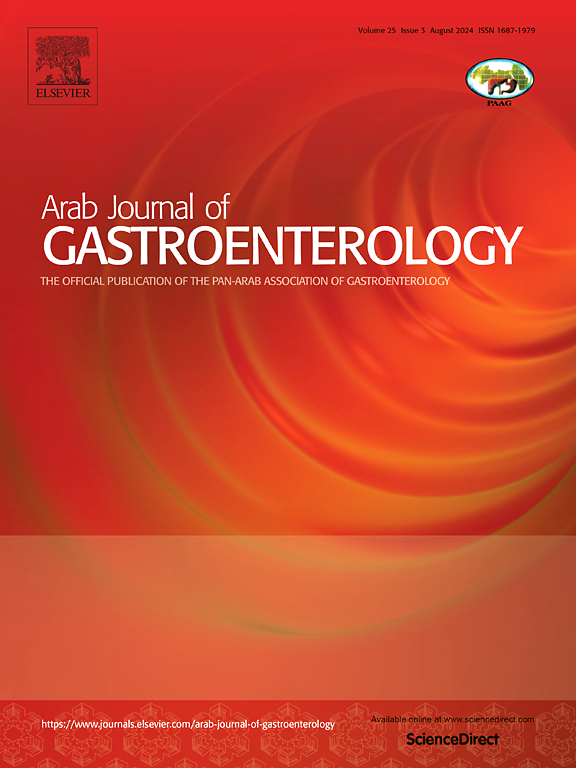Detection of early hidden carcinoma of cardia by reversely entering the esophagus with magnetically controlled capsule endoscopy: A case report
IF 1.1
4区 医学
Q4 GASTROENTEROLOGY & HEPATOLOGY
引用次数: 0
Abstract
Magnetically controlled capsule endoscopy (MCE) is a non-invasive method for gastropathy examination. However, due to the influence of gravity and lumen structure, the traditional capsule endoscopy rapidly passes through the cardia, leading to insufficient observation of the cardia mucosa.
Case Summary.
The patient, a 53-year-old male, had a history of subarachnoid hemorrhage for 5 years, and it has been 5 years since the aneurysm embolization.Computed Tomography Angiography (CTA) indicated the presence of an anterior cruciate aneurysm. Given the risks associated with traditional intubated gastroscopy, magnetic controlled capsule gastroscopy was chosen for gastric examination. Following the standard operating procedure, routine magnetic controlled capsule endoscopy was performed, and no lesions were detected.We combined magnetic force and patient posture adjustment to guide the capsule to pass through the cardia slowly and return to the esophagus, successfully detecting a concealed cardia lesion.Afterwards, the lesions of the cardia were treated with a magnifying gastroscope and endoscopic submucosal dissection (ESD).Pathological findings showed that adenocarcinoma was confined to the mucosa membrane, and in the postoperative pathological study, no tumor remnants or metastasis were discovered.
This paper reports a case of a patient undergoing a physical examination, but no lesion was found during a routine examination using the magnetically controlled capsule gastroscope. However, we discovered a case of hidden early cardia cancer after guiding the capsule gastroscope back into the esophagus under magnetic control.
通过磁控胶囊内窥镜反向进入食管发现早期隐性贲门癌:病例报告。
磁控胶囊内镜(MCE)是一种无创的胃病检查方法。然而,由于重力和管腔结构的影响,传统的胶囊内镜会迅速穿过贲门,导致对贲门粘膜的观察不充分。病例摘要。患者男性,53 岁,蛛网膜下腔出血病史 5 年,动脉瘤栓塞术已过去 5 年。计算机断层扫描血管造影术(CTA)显示存在前交叉动脉瘤。考虑到传统插管胃镜检查的风险,患者选择了磁控胶囊胃镜进行胃部检查。我们将磁力和患者体位调整相结合,引导胶囊缓慢通过贲门并返回食管,成功发现了一处隐蔽的贲门病变。病理结果显示,腺癌局限于粘膜,术后病理检查未发现肿瘤残余或转移。本文报告了一例接受体检的患者,在使用磁控胶囊胃镜进行常规检查时未发现病变。然而,在磁控引导胶囊胃镜返回食管后,我们发现了一例隐藏的早期贲门癌。
本文章由计算机程序翻译,如有差异,请以英文原文为准。
求助全文
约1分钟内获得全文
求助全文
来源期刊

Arab Journal of Gastroenterology
Medicine-Gastroenterology
CiteScore
2.70
自引率
0.00%
发文量
52
期刊介绍:
Arab Journal of Gastroenterology (AJG) publishes different studies related to the digestive system. It aims to be the foremost scientific peer reviewed journal encompassing diverse studies related to the digestive system and its disorders, and serving the Pan-Arab and wider community working on gastrointestinal disorders.
 求助内容:
求助内容: 应助结果提醒方式:
应助结果提醒方式:


